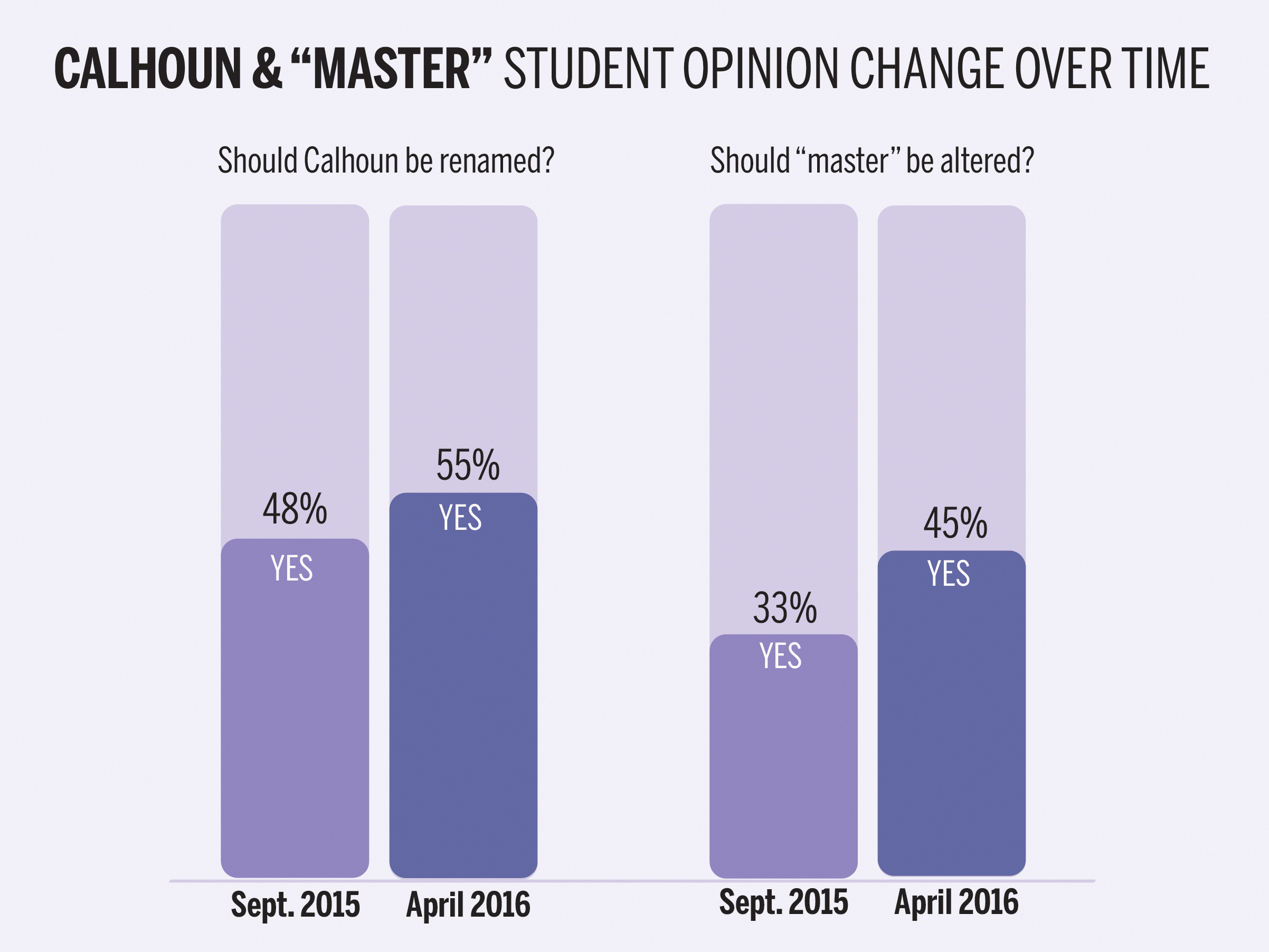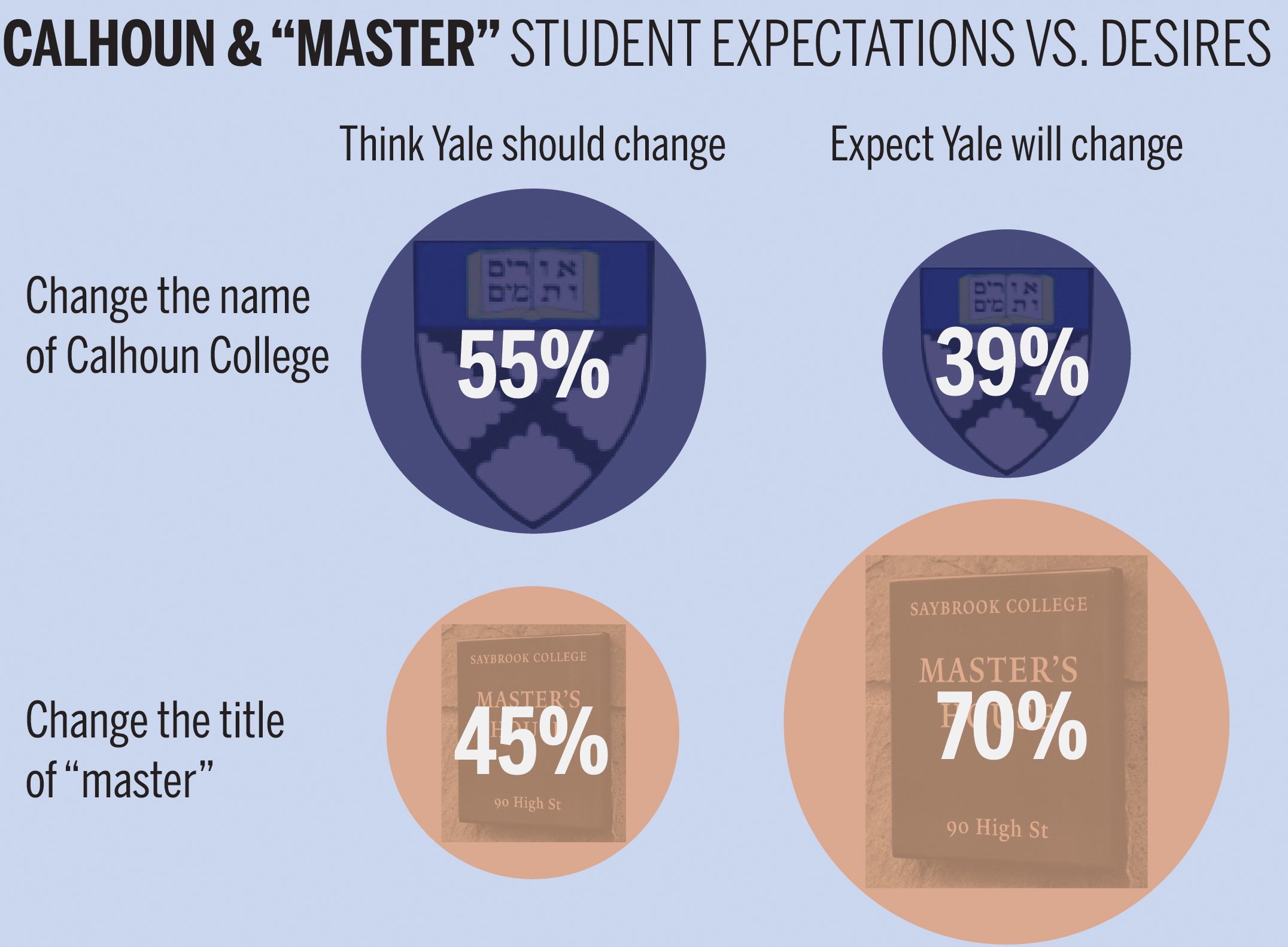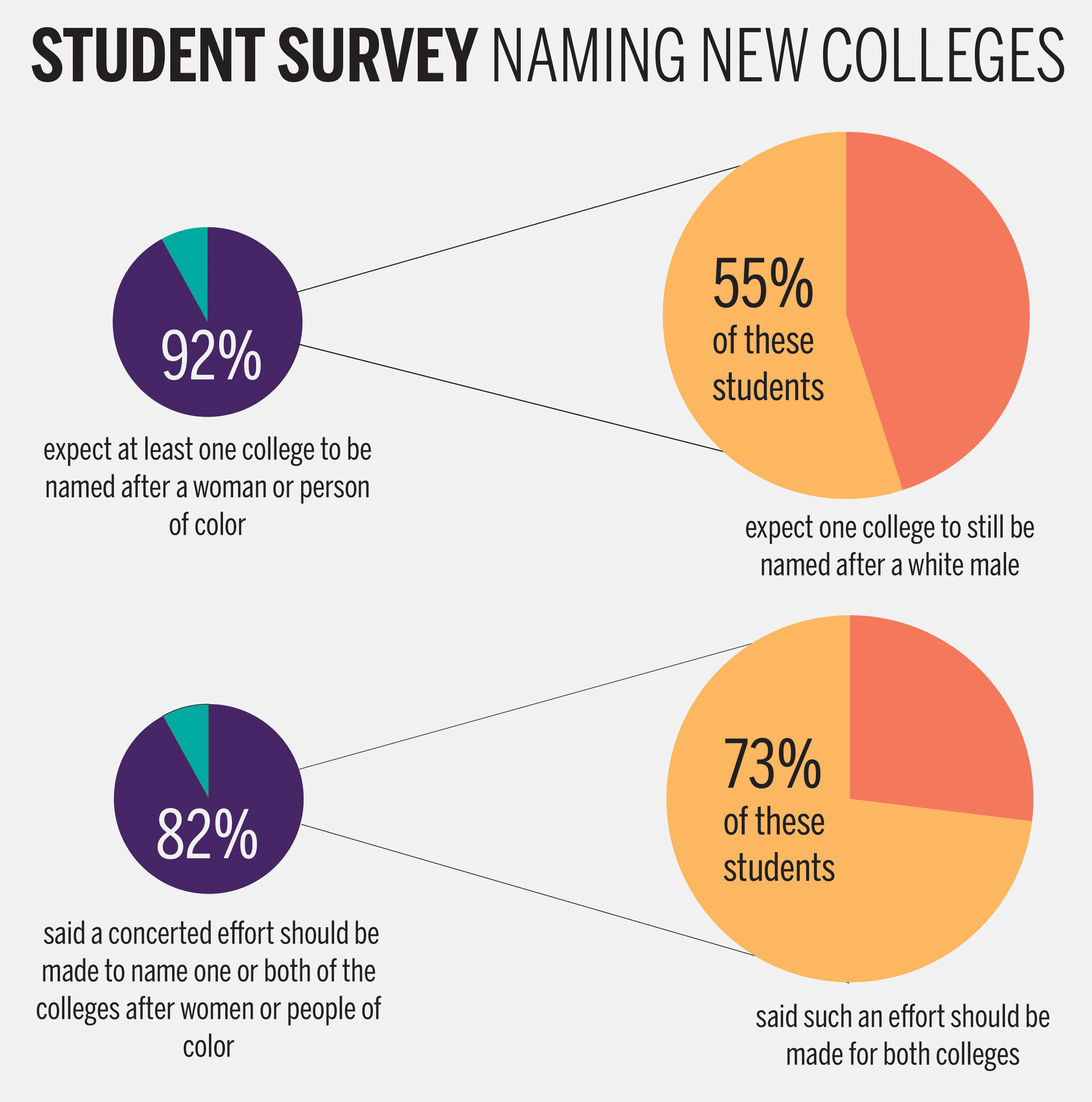In the coming days, three naming debates that have dominated campus conversations throughout the academic year — the title of residential college “master,” the potential renaming of Calhoun College and the names of the two new residential colleges — will be resolved. The results of a recent survey by the News, which received responses from more than 1,700 students, demonstrate a disconnect between how students feel on the issues and how they expect administrators to decide them.
Fifty-five percent of respondents called on the University to rename Calhoun College, while 45 percent believe the title of “master” should be changed. An overwhelming 82 percent said a concerted effort should be made to name one or both of the new colleges after a woman or person of color.
And yet, according to the results, many students do not believe the naming announcements will reflect their opinions, and they do not trust members of the Yale Corporation with these decisions.
MAJORITY OPINIONS
Of the 55 percent of students surveyed who said Calhoun should be renamed, 65 percent said that November’s racial protests influenced their opinions. In a similarly sized survey distributed by the News in September, 48 percent of students who elected to answer the question said the college should be renamed.
Of the students who said the name of Calhoun should change in the more recent survey, 89 percent opposed a partial alteration, such as a hyphenated name.
“Hyphenation will not suffice,” wrote one respondent. “The college should not be named after one of the main proponents of slavery, regardless of what alumni say. The fact that it is still named Calhoun College bewilders me, and I think it disgraces Yale. In light of recent events regarding safe spaces, I think it would be ill-advised, even stupid, to keep Calhoun’s name branded on the backs of the college’s residents.”

For master, 66 percent of the 45 percent of students who said the title should be altered stated that campus protests influenced their point of view. The difference is significant: in September, just 33 percent of students said the title should be altered.
Compared to overall results, these response rates remained relatively stable for students of color as a whole but shifted significantly for black students: 65 percent said Calhoun should be renamed, and 58 percent said “master” should be altered.
The debate about whether to eliminate “master” began in August, when head of Pierson College Stephen Davis asked that students no longer refer to him by the title. Notably, 55 percent of Pierson respondents said master should be changed — 10 percentage points more than the student body as a whole.
Some respondents regretted that the upcoming naming announcements could be disproportionately influenced by the opinions of a small group of students.
“It is upsetting that a few loud voices can bully such prestigious universities into changing their lasting traditions such as the title of master and the name of Calhoun College, and pressure them into actively seeking a person of color and/or a woman to name the new colleges after, when they should reflect the true history of Yale,” one respondent wrote.
But nearly all undergraduates surveyed agreed on the naming of the new colleges: 82 percent said a concerted effort should be made to name one or both of the new colleges after a woman or person of color. Campus protests seem to have had a smaller impact here: just 45 percent of students said November shaped their opinions on the matter.
When presented with these results, Salovey declined to respond specifically and instead explained that Woodbridge Hall has been soliciting opinions from the entire Yale community. He emphasized that all perspectives have been considered.
“I suspect that students recognize that there are multiple Yale constituent communities who have opinions on these matters: current undergraduates, of course, but also other current students, alumni numbering around 150,000, faculty and staff,” Salovey said. “It pleases me that individuals in all of these parts of the Yale community have felt free to express their opinions. And these opinions are quite varied. We are listening, of course, and taking them into account.”
A DISCONNECTED ADMINISTRATION?
The majority of undergraduates surveyed want certain naming decisions but expect others. While 55 percent said Yale should alter Calhoun, just 39 percent think the college’s name will change. And 70 percent of students think the University will alter the title of “master,” even though the majority of respondents oppose such a change.

In explaining their views, many students noted that Yale is lagging behind Harvard and Princeton — both of which have already decided to eliminate the title — and that moving away from “master” is an easy way to appease students.
Student responses indicated a schism between desires and expectations for the names of the two new residential colleges as well. Of the 92 percent of students who said they expect at least one of the colleges to be named after a woman or person of color, 55 percent expect that the other college will be named after a white male. Of the 82 percent of students who said efforts should be made to name at least one of the colleges after a woman or person of color, 73 percent said such an effort should be made for both colleges.

Salovey declined to specifically comment on whether these differences reveal a disconnect between the student body and his administration
Although the Yale Corporation has jurisdiction over these three naming debates, a majority of respondents said they lack confidence in the University’s official policy-making body — an explanation for the apparent lack of faith that the announcements will reflect their desires.
Fifty-six percent of respondents said they do not trust the Corporation with these naming decisions; 73 percent of black respondents said the same.
Many respondents said Corporation members are primarily focused on increasing the size of the endowment, not improving campus life, and are out of touch with the Yale community. One said the Corporation is “too white and secretive” for these types of issues, and another doubted that its members care about the best interests of students.
“I do not know all of the individuals on the Yale Corporation, but I do know that not one of them is a student, most graduated from college at least 30 years ago and only a couple are people of color,” said one black female respondent. “I am not sure they understand as a group the value of envisioning a Yale that is not centered on white and male interests and experiences.”
Salovey objected strongly, stating that Corporation members “love this University” and are legally obligated to act in its best interests.
The three naming decisions will be announced before final exam period.







